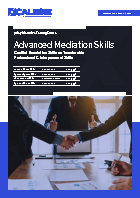| Date | Venue | Fee | |
|---|---|---|---|
| 25 May - 29 May 2026 | London - UK | $ 5,950 | Register Now |
| 12 Oct - 16 Oct 2026 | Barcelona - Spain | $ 5,950 | Register Now |
| 23 Nov - 27 Nov 2026 | London - UK | $ 5,950 | Register Now |
About the Course
The Advanced Mediation Skills training course is designed to equip delegates with advanced dispute resolution skills, including positive communication, negotiation, and the ability to assess conflict sources and the interests and values in a dispute.
Mediation can be defined as extended negotiations between disputant parties facilitated by a third-party neutral in their efforts toward a settlement. Mediation skills are crucial for essentially any professional. They are not only for lawyers, but they go far beyond the field of law as they are transferrable to not just any professional field but essentially any social or interpersonal interaction.
Advanced mediation- and negotiation skills facilitate dialogues and are efficient and sustainable conflict management methods. The ability to conduct mediation and facilitate negotiation leads to an increased level of empowerment of the parties involved and workable agreements for both sides.
The overall success rate of civil- and commercial mediation is 92%, according to the 10th CEDR Mediation Audit 2023. Due to the fact that mediation is party-driven, the parties can come up with flexible solutions. Mediation also protects business interests more as it is conducive to reaching amicable solutions. Mediation being private and confidential helps decrease reputational risks and is considerably more cost-effective than litigation or arbitration.
This training program is efficient and interactive, covering more theoretical aspects such as conflict theories, positive communication methods, identifying parties’ interests, negotiation tactics, and boosting one’s bargaining power. Delegates will get hands-on experience from the first day—the input sessions will be followed by actual simulated mediation sessions, where delegates will be able to hone their mediation skills through simulated mediation and negotiation scenarios to consolidate and apply their newly acquired skills set in a relaxed and playful environment.
Core Objectives
By the end of the training course, delegates will be able to:
- Understand conflict theory to analyse disputes
- Identify conflicts that are suitable for mediation
- Apply positive communication techniques and demonstrate the ability to reframe messages successfully
- Apply advanced negotiation tactics
- Understand and apply basic characteristics of mediation
- Understand the regulation of mediation
- Demonstrate the ability to write a mediation settlement agreement
- Recall the basic principles of commercial mediation
Training Approach
This training course will be highly interactive. The input sessions will be followed by simulated professional practice sessions, during which delegates can immediately practice their newly acquired skills and knowledge and receive peer review and feedback in a highly constructive environment.
The Attendees
Mediation skills are crucial for any professional: they are not only for lawyers but also for business executives, managers, salespeople, and HR specialists, to name a few examples. They are transferrable to any professional field and social or interpersonal interaction; therefore, delegates can apply these skills successfully in every aspect of their lives.
It will be valuable to the professionals but not limited to the following:
- Legal Professionals
- Paralegals
- Business Executives
- Managers
- Salespeople
- HR Specialists
- Customer Service Agents
Daily Discussion
DAY ONE: MEDIATION AND CONFLICTS
- What is Alternative Dispute Resolution and Mediation
- Dispute Resolution Skills as Transferable Professional & Everyday Skills
- The Nature of Conflict
- Conflict Modes/Styles
- The Thomas Killmann Conflict Mode Instrument
- How to deliberately modify your behavior to affect the success of mediation
DAY TWO: THE POWER OF LANGUAGE
- What is Language?
- Forms of Communication
- Language Risks in Conflicts
- Techniques in Communication to Increase Understanding
- Verbal Communication Skills – Tips and Tricks
- In-Person vs Online Communication
- Effective Writing Skills
DAY THREE: MEDIATION AS EXTENDED NEGOTIATIONS
- Mediation: “Negotiation Facilitated by a trusted Neutral Person.” (M. Leathes)
- Facilitation and Finding Common Ground
- “Getting to a Yes Method”
- The Negotiator’s Individual Perspective
- How to Measure the Playing Field
- Assessment of Conflict Sources and Values
- Understanding the Other Side
- How to Boost Bargaining Power
DAY FOUR: CHARACTERISTICS AND REGULATION OF MEDIATION
- Mediation Styles
- Characteristics of Mediation
- Mediation Settlement
- Mediation Agreement Templates
- The Post-Mediation Phase
- Code(s) of Conduct
- Mediator’s Liability
DAY FIVE: A FLAVOUR OF COMMERCIAL MEDIATION
- Benefits of Commercial Mediation – Facts and Figures
- Commercial Mediation: Business, Corporate, Property and Contract Disputes
- Facts and Figures
- Participants: Parties, Legal Counsels, Subject Matter Experts
- How to Select a Mediator
- Cross-cultural Awareness
- Mediators’ Role in Settlement
- Enforcement of Mediation Settlements
Certificate Awarded
Upon successful completion of this training course, participants will be awarded a Certificate of Completion from XCalibre Training Centre, acknowledging their accomplishment. This certificate serves as a testament to their dedication to developing their skills and advancing their expertise in their respective fields.



